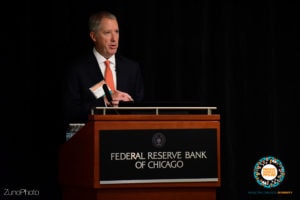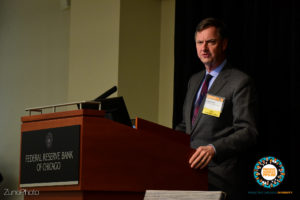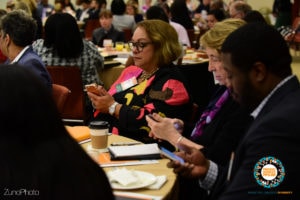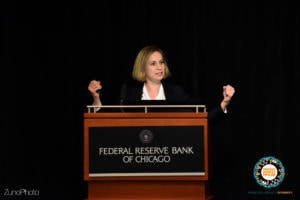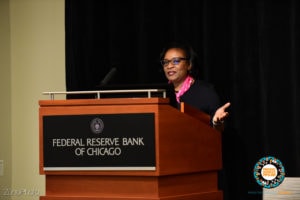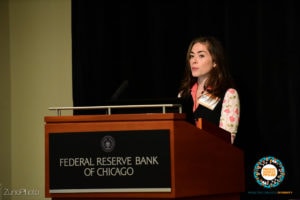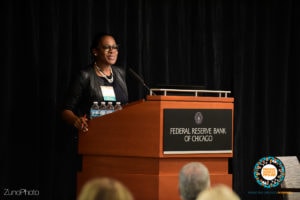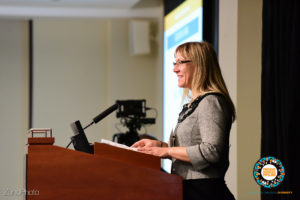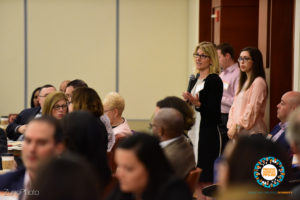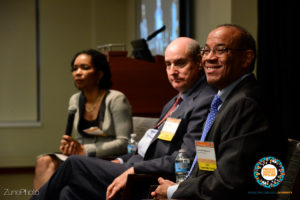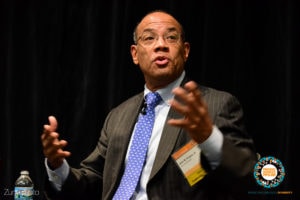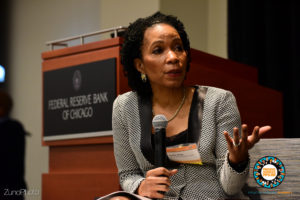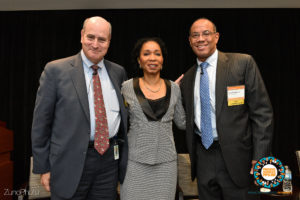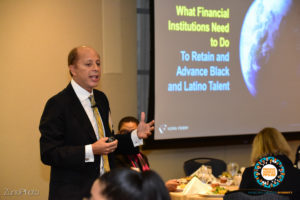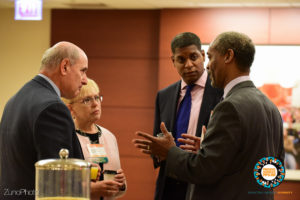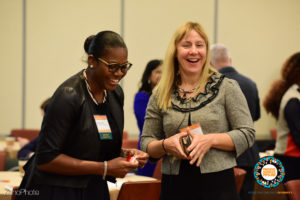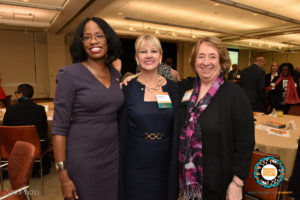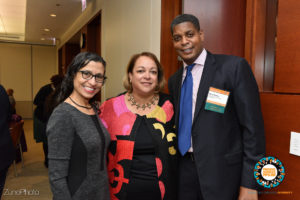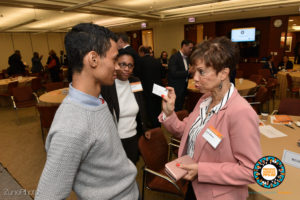Chicago Area Financial Services Industry Leaders Convene to Launch Joint Actions to Increase Diversity and Inclusion
On October 20, 2017, the Financial Services Pipeline (FSP) Initiative convened more than 120 executives and professionals from banking, human resources, diversity and inclusion, community development and philanthropy for its fourth Annual Summit.
Building on the energy and conversation of the 2016 Summit and the publication of the research report in 2015, “Bridging the Diversity Gap,” the Summit marked a time for a revived conversation around diversity and inclusion in the Chicago financial services sector and the need to Advance Cultural Transformation, or ACT, which was the theme of the Summit.
Measures of Diversity and Inclusion – Mercer’s Presentation on the latest Findings
This year, the member firms of the FSP participated in an Internal Labor Markets (ILM) analysis by the Initiative’s research partners, Mercer who presented on the latest findings. The previous ILM analysis, released in 2014, indicated that rates of promotion to management for African Americans and Latinos were relatively high; their attrition levels once they arrive in middle management are also high, showing a retention problem for both groups.
The new findings in the 2017 ILM analysis show major changes when comparing the analysis from 2014 to 2017:
- Lower Rates of Promotion: Over the last three years there are now consistently lower promotion rates for African-American and Latino talent.
- Finding talent is a Strength: African-American and Latino talent is hired at greater rates, and continues to be a strength.
- Directional Change of Attrition Rate: Since 2014, the gap in attrition rates has narrowed, but rates remain higher for African-American and Latino talent.
In addition to the ILM, this year several member firms added on to the participation of conducting an internal employee experience survey resulting in over 11,500 Chicago-area financial services employee total respondents. The overall employee experience highlights:
Differences in Career Advancement Experiences across Groups
- The favorability of career perceptions rises consistently with each higher career level for white males, but not so for other groups
- Both African American men and women experience a notable drop in perceptions of fairness around opportunities, as they reach the highest ranks
- Latina respondents show a consistent drop in career-related satisfaction at senior level management and above
Factors Most Influencing Satisfaction with Promotions for Professionals & Above
- Common drivers of satisfaction with promotion opportunities across race/ethnicity include opportunities to develop and utilize skills, and fairness in opportunities and rewards
- Satisfaction with leadership is a unique driver of promotions satisfaction for African Americans
- Ratings of fairness in opportunities and distribution of rewards are notably lower for African American and Latino respondents
- Having a professional champion or sponsor within the company is related to satisfaction with promotion opportunities for white professionals and above
Factors Most Influencing Professionals & above to stay in, or Leave the Financial Services Industry
- Satisfaction with the opportunity to reach long-term career goals, and leadership are drivers of intent to stay in, or leave the industry for all three race/ethnicity groups (African American, Latino and White).
- Work stress and perceptions of the ethics and integrity of co-workers also emerge as significant drivers for Latino and African American Professionals and above this year
- Satisfaction with promotion opportunities was a unique driver for Latinos
- Fairness in distribution of rewards was a unique driver for African Americans
- As in the 2015 analysis of the full population, whites have the unique drivers of relationships with co-workers (rated notably higher than African American responses), and prestige and status of the industry (rated lower than Latino responses)
- Four of the five drivers of intent to stay or leave for African American Professionals and above are rated notably lower (at least 5 percentage points lower) than whites.
The Mercer team who presented at the Summit included, Alina Polonskaia, Bess Tschantz-Hahn and Rick Guzzo. They explained key findings and their recommended action items for the industry as a whole and for individual employers for improving the recruitment and retention of African-American and Latino talent in Chicago.
The financial services industry must increase promotion rates for African Americans and Latinos, while continuing with retention efforts, to increase representation at higher levels.
Retention remains the single most powerful leverage point for increasing representation of African-Americans and Latinos at the highest career levels, with simultaneous changes in attrition, promotion and hiring dynamics yielding the largest increases in representation.
Retention Best Practices & Update on Collective Work – Joint Efforts Continue to be a Focus
After the Mercer presentation, Perika Sampson, Regional Diversity Officer, Morgan Stanley Wealth Management and FSP Steering Committee co-chair shared examples of retention initiatives and projects that FSP member firms are doing within their organization. Many firms are implementing programs like diversity leadership summits, mentor programs and employee resource groups to engage African American and Latino talent within their organization.
In addition to retention best practices FSP leaders shared updates on the status of FSP member firms collective work this year on Community Presence, Retention and Hiring and Retention. During the presentations, Ellie Forman, Corporate Community Relations Manager at Mesirow Financial, shared how FSP is developing a geographic map of Chicago to show a landscape of member firms’ work in outreach at the high school level in the Chicago area and how to leverage this to create partnerships to increase the exposure to the industry. Ellie reviewed the development of a digital toolkit that will be used as a tool for member firms who are speaking at schools or for high school level students to learn about career pathways.
Deidra Jenkins, Senior Vice President and Chief Diversity Officer, Northern Trust, presented on the FSP’s efforts around recruitment and hiring and addressed where member firms are recruiting, where they are recruiting and who they are recruiting. Teri Hart, Director and Chief Learning Strategist, Discover Financial Services, presented the final highlights and shared information about programs, training and support FSP is providing to African American and Latino professional around development and retention. Details from each presentation can be found below.
During the Summit, the new CEO Leadership Council Co-Chairs, John W. Rogers, Jr., Chairman and CEO of Ariel Investments, and Matt Feldman, President and CEO of Federal Home Loan Bank of Chicago, and Helene Gayle, President and CEO of the Chicago Community Trust, discussed how they plan to work together to carry out the organization’s mission. The co-chairs spoke about their collective vision for the FSP Initiative and how collective work and participation is critical for African American and Latino talent in the financial services industry.
The Summit closed with lunch and a presentation by guess speaker, Andrés Tapia, Senior Client Partner and Global Diversity & Inclusion Solutions Leader for Korn Ferry. Andrés shared his perspective on “next-generation diversity” and how this approach is key for companies that wish to move the needle on diversity and inclusion (D&I). Tapia is the author of “The Inclusion Paradox: The Obama Era and the Transformation of Global Diversity.” He is one of the leading voices in shaping an approach to D&I that incorporates cultural competency and the business imperative to enable success.
Attendees at the Summit received a copy of the annual FSP Initiative 2016 Index. The Index offers a snapshot of racial/ethnic diversity within Chicago metro’s financial sector from 2011-2015, with a focus on African-American and Latino representation, and also puts the data into a national context.
The Summit materials are available below:
Event Photos

